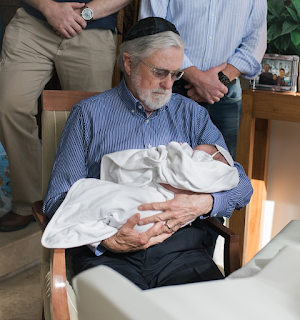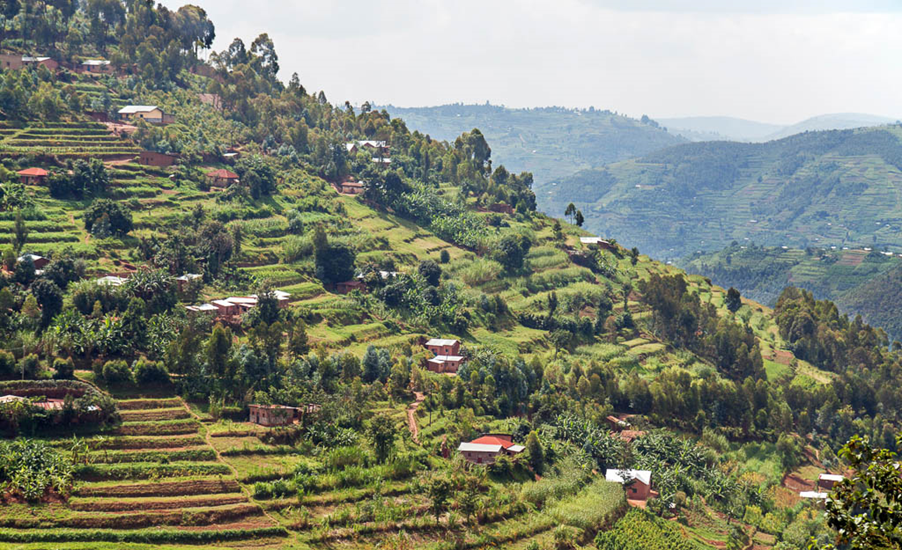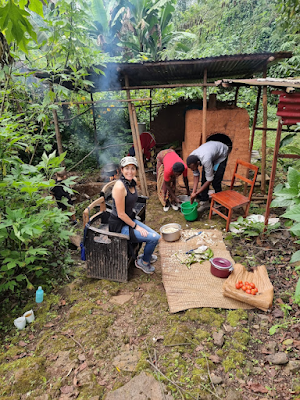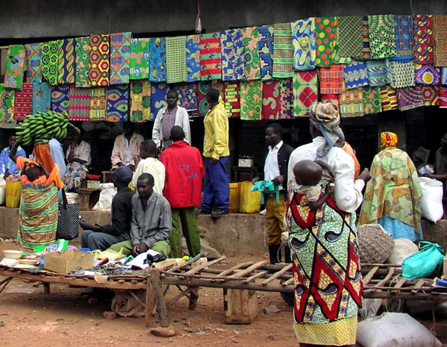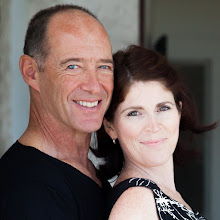Rwanda Trip - March 2022: Jane, Benjamin, Andrew
by Andrew Canter, with edits by Jane Fraser
When one envisions "deepest
darkest Africa" then the great lakes region of Africa (the famous
"rift valley") might be the area one envisions. In the middle of that region -- straddling
the watershed of the Congo and Nile rivers and a metaphorical stone's throw
from Lake Victoria -- is the tiny, landlocked country of Rwanda. Well, landlocked except for the giant Lake
Kivu*, which forms much of its border with the Democratic Republic of the Congo,
or DRC as it is known. The north of
Rwanda is bounded by a string of volcanoes -- dormant -- which form the highlands,
the Volcanoes National Park, and the home of the famous mountain gorillas. The country is nicknamed “The Land of a
Thousand Hills" since there is almost no flat land anywhere. Much of the transport is taken by foot and
bicycle, and it appears that the people are very industrious and hard-working
and so are evidently fit. Rwanda thus has very competent and competitive
cyclists and runners. From the outside Rwanda is known principally for two
things: The Genocide (which, in April 1994 occurred at the same time as South
Africa's first democratic election), and the Gorillas (and Diane Fossey of
"Gorillas in the Mist" fame).

The genocide is as much of a "historical event" as
apartheid is: But that's a two-edged statement.
Since 1994 Rwanda has clearly worked hard to create a unified
"Rwandan" country, where tribes are not mentioned, and the genocide
is seen as a "dark historical spot".
In this telling, the genocide was birthed by the Catholic church and
colonisers… abetted by an uncaring world… and a stain on the people's
history. But such things are always
under surface… and probably not so deep: All it would take would be one
power-hungry, rabble-rousing politician to tear open old wounds, old hurts, and
old prejudices. As Paul Kagame has been
a strong-man in charge since 1994, and has imposed order on the country, the
genocide has subsided in the recesses: One can't help but wonder -- and fear --
for the future. That said, the country
does not hide from this part of history -- everyone experienced it, there are
genocide memorials in various places, as well as a large genocide memorial in
Kigali where the remains of over 250,000 victims (out of over 1,000,000!) are
buried under concrete in mass graves.
The museum is a pointed, somber and genuine (sufficiently such that
children are not allowed to visit) reminder of the horrific events that
unfolded. It’s all there to be
acknowledged. It is an uncomfortable, sad, and extremely distressing, but
important, part of a visit to Rwanda.
The Gorillas:
The main reason most
people are drawn to Rwanda is for an opportunity see the famous Mountain
Gorillas up-close-and-personal. It’s
quite a trek to get there: Fly to Kigali, get a clear PCR test, drive about 2.5
hours north to Ruhengeri, get to the National Park office at 7am on trek day,
then trek uphill into fairly impenetrable jungle… to get your 60 minutes with
the gorillas. It’s also costly: A
trekking permit for a day costs US$1500 -- but currently, due to Covid, African
residents pay "only" US$500.
That said, the process is very well managed, as are the gorillas
themselves -- evidently left to their own devices in their safe-haven on the
border of Rwanda and Uganda, but also clearly tracked daily so that they can be
visited by the groups of tourists.

The end result is a
great overall experience, with clear rules, good guides, and a real feeling for the
gorillas in their natural habitat. The
obvious question is "did you see the gorillas?" Given the cost, and management, it seems that the Rwanda Parks more or less assures you that you will see gorillas,
and have a real up-close experience, even if you have to trek further than you
intended.
On arrival at the Park Headquarters you will be asked "how far do you want trek?" There seem to be 3 options -- hard, medium and short: With no guarantees (since the gorilla groups do move all the time), that seems to imply between 30 minutes and several hours of upward trekking to find a gorilla group. We had organised a baby-sitter for Benjamin for the full day, so we chose the "hard" trekking option. Reckoning that; we enjoy exercise and adventure, would get an opportunity to climb the side of the volcano at the same time, and would also get to see a potentially less visited troop too. Assuming most others would select the easy/short option in the grasslands.



As it turned out, again, due to Covid - and also March/April being "rainy season" -- our group was just the two of us and our 2 guides (a group can normally be up to 12 visitors plus guides). So, we got a ‘private trek’ which apparently can cost up to $15 000USD (as facilitated for celebs). After a 20-minute drive on truly disastrous roads to get to the start of our trek on the slopes of Mt Bisoke. We then embarked on a pretty treacherous hike; climbing steep, very muddy, tracks upward into the jungle (Note to self: Wear long pants and shirt and bring mud-gaiters both for the mud AND the stinging nettle/thorn!). Any plans of staying clean and dry were soon abandoned, as the focus shifted to not losing a shoe in the deep mud, and not grabbing onto or falling into the stinging nettle! Walking sticks are provided and they are a necessity to navigate the slippery and steep climb both up and down the mountain.

Being at around 3000m
altitude also adds to the physical exertion. While it is not actually a super-strenuous
climb, due to the altitude and conditions, it is rather treacherous, so you must
be up for the challenge to select the option we did. We enjoyed this though as it added
authenticity to the ‘jungle trek’ experience and was not at all like simply
visiting a zoo. There are trackers on the mountain who find and follow the
troops each day, both to ensure their safety and also to relay their location
via radio to the trekking guides. So finding the gorillas wasn't unduly
confusing, but did have us going off the trail. We had been pursuing them up
the side of the volcano, but due to the cold and rain they had started
descending again, so we intercepted them coming down the far side of a volcanic
crater by looping around the bottom.
We trekked up the
mountain-side for about 90 minutes. While there are some trails, once you
approach the vicinity of ‘your’ troop, your guides then proceed to cut a path
through the jungle with machetes to allow you to get close to the troop. This
saw us stumbling and slipping our way through the very muddy very lush jungle thickets
in the gentle rain. Upon arrival near "our" gorillas, we had to leave
our backpacks and other ancillary items, put surgical masks on, and then
approach the group quietly. From then,
you have a timed 60 minutes with the gorillas.

Frankly, no amount of
text is going to describe the experience of being with the gorillas. The abiding sense is "peacefulness"
(Acceptance? Lack of stress/annoyance at our presence? Naturalness?) of the
gorilla group who simply went about their business of clambering in trees,
walking around the bush, sitting or lying down, playing, nursing, eating or
grooming. They were not oblivious to
people in their space but have been so well "habituated" (as the
Rwandans say) as to make you a "part of the family". We'd been advised the younger male gorillas
will sometimes seek to touch (or possibly hit) you in curiosity, but when one
of them tried to approach us our guide shoo'ed him away, as they want to avoid
any direct human interactions to keep them as ‘wild’ as possible.


Just as words can't
capture the experience, neither can photos or videos -- the combination of the
sounds, smells, rain, mist, breeze, texture, movement, and simply closeness is
not replicable. The time passes quickly as simply watching the gorillas is
fascinating and inclusive. In the end, one comes away with a feeling of
having truly accomplished a "bucket list" item.
While it’s a well-managed tourist experience, it is clearly not a zoo, and while it could be more "wild", the fact is that the gorillas are able to live without fear, unmolested (un-poached for 20+ years now!), and happily because the system works for them, the people, and the country.
Rwanda in General:
For the present, Rwanda is an "African country that works": Make no mistake, it is poor, nearly entirely rural, and very agrarian -- but it has good trunk-roads, good communications infrastructure, and a service orientation. It presents itself as the Chile of Africa -- an island of coordination in a sea of disorganisation.

The people are, no
doubt, the highlight: Again, while not
rich, people dress with pride, and dress well -- nearly everywhere, and nearly
all the time. The women in particular stand
out wearing brightly patterned cloth, sometimes simply wrapped and draped
around themselves in an almost sari-type manner for the poorer rural woman, and
otherwise in beautifully styled dresses. There is also a pride in the country,
expressed in the almost complete lack of litter, generally good maintenance
(even of mud-brick houses), and a sense of being law abiding (again like Chile,
one has the sense that if someone tried to bribe a policeman they would end up
in jail). The last Saturday morning of
each month is dedicated for all citizens to do some sort of community service
-- fixing each other's houses… building small scale infrastructure… cleaning
up… working together. But beyond that
citizen activity, there is a genuine and natural warmth, friendliness, desire
to engage. Everywhere we went and
everyone we dealt with was polite, warm, engaging, and caring. The voices were not lethargic and/or
uncaring, but always engaged and engaging.



Benjamin -- at this
point nearly 4 years old -- was welcomed, played with, and treated with love and
kindness everywhere: From walking in towns… to walking in villages… to playing
with children in various places… to playing with adults everywhere. Not a single person seemed ever exasperated,
impatient, annoyed, or in any way put-out by Benjamin's antics. In fact, if anything people were far too indulgent
and didn't assist us to set any boundaries at all. For his part, Benjamin seemed unfazed to be
followed and jostled by (literally) dozens of village children (and adults) at
a time… and to be the centre of attention everywhere. It was as if we were
walking around with a country full of play-mates and baby-sitters to give us a
break nearly every day.



We never felt unsafe
or intimidated anywhere, at any time of day or night. When running (which we both did) we'd pick up
friendly locals, either local children who couldn't resist running with a mzungu
(foreigner/white person), or local men just on their way home (or to work), who
would lope along beside you, sometimes making conversation, sometimes not. And even children wear flip-flops seemed to
easy be able to hold a steady running pace. Andrew went for a run one evening
at lake Kivu and ended up running 5km with an escort of 5 guys, all who kept
pace… although none of them actually had running shoes… and all being friendly,
conversational, and encouraging.

We felt entirely
comfortable letting Benjamin be some distance (e.g. 100m) from us in rural
villages, playing with kids or just running ahead. Funny enough, while he has good
"car" sense (i.e. to get out of the road), when he was confronted
with 4 cattle coming down a dirt road at him, it took a little girl to drag him
by the arm out of their path. The
welcoming nature of the people made it very comfortable and possible to just
stop in villages or on the road side and go for a wander. At one point we were
driving past a tea plantation, so we pulled off the road to go for an ad-hoc stroll.
The people doing civil works and tea harvesting were completely unfazed, and
welcoming. For fun Jane ended up
carrying a 15+kg basket-load of stones on her head, alleviating the 10-11-year-old
local girl who good naturedly laughed at Jane.

The soil is rich,
volcanic, and dark brown -- so nutritious you want to scoop up a few
tablespoons to sprinkle on yoghurt (which the locals don't seem to eat) or ice cream (which
is very scarce also). It seems
everything grows in Rwanda… usually in profusion, and often in a chaos of
species and types of plant. The country
is ALL hills and does not lend itself to large-scale commercial agriculture --
(We're not even sure how they found a piece of land flat enough for Kigali's
airport). But, remarkably, it seems ALL
the land is worked by someone… and you see thousands of people working the
fields, carrying bundles of sticks, vegetables, grass, etc. all over. Equally, people are transporting their banana
beer, or logs, or livestock, or themselves on bicycles and by foot. Many
carrying hand-made tools such as hoes.
One gets the sense that nothing goes to waste… and everything (including
twigs, sticks and grass) is used for something.
Packaging seems rarely used, or not very visible -- and plastic shopping
bags are (literally) illegal to even possess.
It’s a poor but prideful and productive country. We feel like we see more "desperate
poverty" on the streets of Cape Town in a single day than we saw in 9 days
in Rwanda.
There are few cars,
and not too many trucks: Mostly goods and people are transported on bikes,
foot, motorbike taxis, and a few trucks and buses. The main roads are paved, and there are rigid
rules for speed -- with a network of wired-up speed detectors which -- when
they trap you -- will automatically issue the ticket within minutes and email
it to the owner of the car (we got 2 tickets, despite my genuine attempt to
stick to the speed limit diligently).
There is a payment network run by the government (IREMBO) which allows
you to pay for any government service, fee, or fine in branches or at
banks. This would apply also to paying
in advance for Covid PCR tests, and a similar system for national parks
bookings and payments. It seems most people make extensive use of
cell-phone based mobile money apps to effect transfers. Again, the system works.


While poverty is not
clearly evident, in the tourist areas it seems one of the key English phrases many
kids (and some adults) have learned is "give me money" which some say
liberally. Annoying… and an evident
result of too many well-intentioned tourists doshing cash around.
Covid
Travelling during
Covid is a two-edged sword: On the one
hand, people are really happy to have you, and prices are low, rooms available,
services available on tap, and -- essentially -- you have the undivided
attention of full staff complements. In
two of our hotels we were either the only guests, or one of only 2-3 rooms
booked. On the other hand, it does feel
a little lonely… activities are under-booked… and there is a certain missing
"vibe". Worse are the constant
Covid PCR tests, always with the attendant risk of being put in quarantine
(and, keep in mind you must register with the government website, so if you
test positive, you will certainly be in enforced quarantine). We had to have a PCR before leaving South
Africa, again upon arrival in Kigali, again before visiting the gorillas, and
once more before flying back to Cape Town: In a sense we did the public
hospital tour of Rwanda.
Planning, pricing and activities:
Pricing was a little
erratic: When we first started planning we dealt with a range of agents who
packed on heavy margins -- so the trip could have been very expensive. But we controlled costs by renting a car from
a small local operator ($35/day all inclusive) … to finding hotels ourselves (not
that many hotels were on sites like Booking.com, a Google accommodation search
was actually most useful)… to finding and booking our own excursions… and also eating
frugally (we found that ordering one "main course" was nearly always
enough food for all 3 of us). Still, as
a tourist you always pay more… and Rwandans often price in US$ (which is easy,
because $1=RwF1000), and you often feel things are rounded-up to your disadvantage. Overall though, I'd say Rwanda prices (for
food, drink, accommodation, activities, etc.) are more-or-less the same as Cape
Town.

Funny enough, finding
activities was a little more difficult than expected for such a
"wired" country. Still, with
some effort we found some interesting activities:
We had a very well
equipped and organised bike trip from Musanze to the Twin Lakes -- a scenic and
fairly challenging 20km -- through rural towns and farmlands. We had a boat ride and local beer at the lake.
A coffee tour (replete
with planting trees, harvesting, washing, husking, roasting, grinding, brewing
and drinking)
Visiting local hot
springs with the locals (where Jane got an unexpectedly aggressive exfoliation massage from an ancient
mute woman, using too-gritty lake sand – this was quite the experience!)
We also spent a lovely
afternoon at red Rocks Rwanda in Musanze, where we tasted the famous local
banana beer (potent stuff!), and also had a traditional cooking experience
where we helped to cook a few simple vegetarian dishes over an open fire, and then
shared these with the local women we’d cooked with. Benjamin declared it the 'best food ever!'
We also enjoy
exploring local markets, so spent time in these looking at fabrics etc.
We sense is there is
much more to find, but it didn't jump out at us. The people know how to use the Internet, but
don't seem to know how to market their services there. Without doing research work, Rwanda could be
seen as "boring" or lacking in activities… or you could do a
drop-in-fly-out or a basic "tourist route" trip (e.g. 4 days). We had about 8 days on-the-ground, and there
are activities I'd plan on for another trip, such as:
- Hiking/biking (all or part) of the Congo-Nile
trail -- which is an established route on the western bank of Lake Kivu
that runs between the watershed of the two great rivers;
- Going on a bee-keeping tour (in season) to see
how the home-made bee hives are formed, placed, and later harvested;
- Going into the Southern Congo to do the overnight
trip to the active volcano where you can look into the lava filled crater
at night;
- Spending time in Nyungwe Forest National Park --
home of primates -- as well some other areas in the South West of the
country.
In any case, if you
really just want to soak up Africa -- walk with the people, drive across the
country, see the scenery, engage with the locals -- then Rwanda is a very
accessible, safe, affordable trip. And,
to repeat, we would comfortably recommend it to any parents as a very
kid-friendly destination.
*Lake Kivu is very deep
and holds trapped carbon dioxide and methane under pressure in its depths… that
makes it dangerous if the CO2 or methane bubbles out, but this is also now
being tapped as a source of gas for a 500mw power plant.










